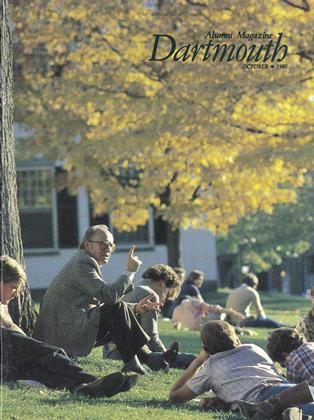When you live in or near Hanover, it is easy to forget just how beautiful the place is. Of course it's lovely anyone who has ever seen the place will attest to that. But living here is something like living in a house with a spectacular view; the only time you really see the view yourself is when you have guests over and they gush and fall all over the place in ecstasies of praise for what has all too often become a commonplace, a given of your existence. The question is, will Hanover be like this in another 20 years or even in that strange new time 15 years from now when you try to get used to writing the year 2000.
It's probably as much a matter of perspective as anything else. For there are certainly people who have lived in this area for as little as 10 or 15 years who will tell you how much this town has lost and how the notso-subtle growth of our own little Tri-Town area (that's Hanover-Lebanon-White River Junction, flatlanders) has already threatened to alter forever the "lifestyle" so many people came here to enjoy in the first place. Frankly, if you spent the last 10 years commuting from Hoboken to the Big Apple, the ride down from Strafford or up from Enfield is not only a breeze, but a refreshing one at that. And if you never saw Hanover before 1983, say, all you would do is gush with enthusiasm along with the ever-increasing throng of tourists who come by car, van, bus, or plane to this little crossroads of New England. But talk to the native Hanoverian or Norwichite and you get a different story.
We're not the first people in history to have witnessed wholesale changes in the way our hometowns look; indeed, in view of the staggering devastation of the 20th century, we are fortunate to have hometowns at all. Yet for many of us, coming home after several years away can be a depressing experience. What you are apt to find is the aftermath of drastic changes in values and accepted social behavior. If it were just the way Main Street looks, that would be bad enough, but you can hardly go to the drug store without locking your car door, to say nothing of the back door of your home only a mile or two down the road. Could those horror stories you see on TV and read about in Time ever happen in Hanover? Will big-city problems seep in here?
Unfortunately, it seems to be just a matter of time. Some less terrifying earmarks of the big city are already visible. There's real congestion not only during rush hour, but quite often on weekends (even when there's no football game at Memorial Field); there are traffic lights where not so long ago there were none; and there are plastic golden arches and neon signs edging closer and closer to the Green. Local real estate now has a big city price tag, largely because of the quality of life in the area and the super highways that make New York and Boston so much more accessible. Yet for those who were never here before 1983, and for those bright young kids who just checked in as members of the Class of 1989, there was hardly any place that looked more green, more inviting than Hanover. Here's hoping that when they trade stories about their ventures in the wide, wide world at their 25th, it looks every bit as good as it does today.
 View Full Issue
View Full Issue
More From This Issue
-
 Cover Story
Cover Story"Are the fireflies ghosts?"
October 1985 By Priscilla Sears -
 Article
ArticleEfrain Guigui: Well-tempered conductor
October 1985 By Georgia Croft -
 Sports
SportsOn the road to Cambridge. The Harvard Game
October 1985 By Jim Kenyon -
 Class Notes
Class Notes1979
October 1985 By Burr Gray -
 Article
ArticleThomas V. Seessel '59: "It's okay to say 'No' "
October 1985 By Rex Roberts -
 Class Notes
Class Notes1982
October 1985 By Emily P. Bakemeier
Douglas Greenwood
-
 Lettter from the Editor
Lettter from the EditorSettling in in Hanover
JUNE 1983 By Douglas Greenwood -
 Lettter from the Editor
Lettter from the Editor75 and Counting
OCTOBER, 1908 By Douglas Greenwood -
 Lettter from the Editor
Lettter from the EditorRuffly Speaking
NOVEMBER 1984 By Douglas Greenwood -
 Feature
Feature"I have Nineteen Thousand. Do I hear Twenty?"
MARCH • 1985 By Douglas Greenwood -
 Lettter from the Editor
Lettter from the EditorA Family Affair
JANUARY/FEBRUARY 1986 By Douglas Greenwood -
 Lettter from the Editor
Lettter from the Editor"Only Connect..."
MAY 1986 By Douglas Greenwood
Lettter from the Editor
-
 Lettter from the Editor
Lettter from the EditorEditorial Comment
MAY 1930 -
 Lettter from the Editor
Lettter from the EditorEditorial Comment
JANUARY 1932 -
 Lettter from the Editor
Lettter from the EditorPresident Hopkins' Tribute
May 1937 -
 Lettter from the Editor
Lettter from the EditorThe Numbers Game
JANUARY/FEBRUARY 1985 By Douglas Greenwood -
 Lettter from the Editor
Lettter from the EditorA Family Affair
JANUARY/FEBRUARY 1986 By Douglas Greenwood -
 Lettter from the Editor
Lettter from the EditorFrom the Editorial Board
Sept/Oct 2002 By Holly Sorensen '86

